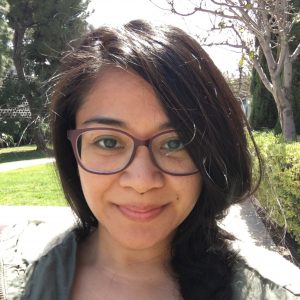



Three graduate students in Comparative Literature have just been awarded prestigious Graduate Student Mentorships for the 2018-2019 school year at UCLA. Clockwise, from top left, they are: Catherine Illingworth, Shane Black, and Stefanie Matabang.
The Graduate Research Mentorship (GRM) Program is designed to assist students in acquiring and developing advanced research skills under faculty mentorship. The program is open to UCLA doctoral students in the arts, humanities, social sciences, public health and nursing. What follows is an introduction to the research of each winner.
Shane Black:
“My project argues that Mercury, the divine herald of Vergil’s Aeneid, supersedes his brother Apollo as the god most suited allegorically to the imagination of the writer in the medieval and early modern literature of Europe. This shift mirrors a fundamental change in the development of the artistic persona in Europe that privileges improvisation within the structure of genre, just as Mercury freely interprets the rigid decrees of Jupiter.”
Stefanie Matabang:
“My project examines two colonial variants of the Medieval French epic, the Song of Roland. These texts, the Middle Welsh Cân Rolant and the Tagalog Doce Pares sa Francia, were adapted and composed in English-occupied Wales and the Spanish Philippines. In her book, Creole Medievalism, Michelle Warren refers France’s national epic as ‘medieval literary history comfort[ing] modern colonialism’ in the French colony of La Réunion. Somewhat conversely, she also refers to the poem as a ‘Creole epic,’ highlighting the crucial elements of cross-culturalism and métissage embedded throughout the text.”
“I will explore how the redactors of the Welsh and Tagalog versions rendered the multifaceted backdrop and complicated cultural tensions of the Charlemagne narrative for their native audiences. How is colonial trauma and the foundation of nation supported or subverted in these two separate Charlemagne variants? Also, how are the ‘pro-Francia’ sentiments of the original French text filtered down into the Welsh and Tagalog versions and what does this say about the transmission of stories in the colonial space that seem to actively promote other foreign bodies/powers? This project will be the first to engage with and analyze the Philippine version of the Charlemagne narrative, placing it in extensive dialogue with corresponding versions, especially the Welsh Cân Rolant, elucidating a previously unknown connection between the Old French Song of Roland and Welsh and Philippine colonial literature.”
Catherine Illingworth:
“The spiritual significance of Dante’s journey in the Divine Comedy presents itself readily to first-time readers, but the poem’s rich landscapes, architectural features, and discussions of the body raise questions about its material significance. The poet explains in Paradiso that matter itself is an expression of the mind of God, not merely a signifier of the divine but the tangible product of God’s self-giving. Existing scholarship proves that matter is theologically significant for Dante; this project pursues that premise within the poet’s material context, rooting his broader theological claims about matter in his own physical environment.”
“My project examines with unprecedented granularity the details of Dante’s material choices, particularly the marble, scorched stone, and porphyry that compose the Purgatory gate. Why these substances? What did these substances mean in Dante’s time and place? How do these materials aid the pilgrim journey, and why are they placed at this threshold? I will seek to articulate Dante’s theology of matter by examining these specific materials in the poet’s medieval Italian context.”

